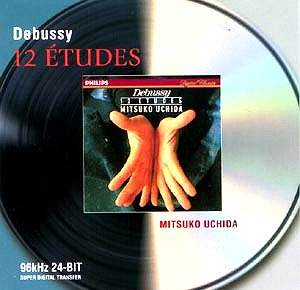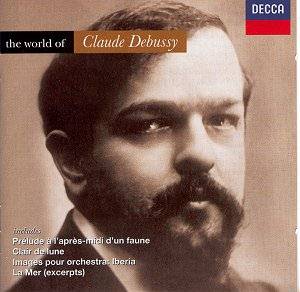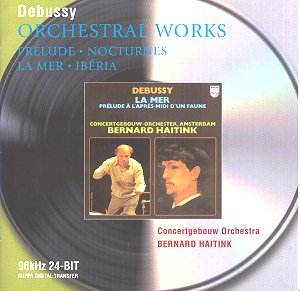 Composer: Debussy
Composer: Debussy
Works: 12 Études Mitsuko Uchida (piano)
Recording: Philips 464 698-2
Duration: 47 minutes
Date of Performance: April 1989
Label: MASTERWORKS
In the landscape of late-Romantic and early-20th-century piano repertoire, Claude Debussy’s 12 Études represent a watershed moment, not only for their technical challenges but also for their audacious departure from traditional harmonic and structural norms. Mitsuko Uchida’s interpretation, recorded in April 1989, stands as a significant contribution to the canon, illuminating the multifaceted nature of these works while capturing the essence of Debussy’s innovative spirit.
Historically, Debussy’s Études were composed between 1915 and 1917, a time when the composer was grappling with the profound implications of war and the shifting cultural milieu of France. Originally intended as a tribute to the legacies of Chopin and Couperin, these pieces serve as both homage and a departure, showcasing Debussy’s unique voice. Each étude is designed to explore specific pianistic techniques—be it the exploration of sonority, rhythm, or polyphony—while simultaneously challenging the performer to transcend mere technicality in pursuit of expressive depth.
Uchida’s interpretation is marked by an exquisite balance of fire and finesse. In the first étude, “Pour les sonorités opposées,” she masterfully navigates the contrasting textures demanded by Debussy, employing a delicate touch that allows for the rich timbral palette to emerge without sacrificing clarity. Her use of pedal is particularly noteworthy; it enhances the harmonic resonance while maintaining the distinct lines of counterpoint. This approach stands in contrast to more percussive interpretations, such as those offered by Pierre-Laurent Aimard, who favors a more aggressive articulation, potentially overshadowing the subtleties inherent in Debussy’s writing.
In the sixth étude, “Pour les octaves,” Uchida’s agility is on full display. Her phrasing brings an unexpected lyricism to the rapid octave passages, a choice that elevates the étude beyond a mere technical exercise to a deeply musical statement. This contrasts sharply with recordings by the likes of Martha Argerich, who, while dazzling in her technical prowess, sometimes sacrifices interpretative nuance for sheer velocity. Uchida’s careful attention to dynamic shading and the ebb and flow of tempo allows listeners to appreciate the textural intricacies that Debussy meticulously crafted.
Moreover, Uchida’s exploration of “Pour les notes répétées,” the ninth étude, reveals a profound understanding of the emotional weight behind repetitive motifs. By varying her touch and employing subtle rubato, she transforms what could be perceived as a mechanical exercise into a poignant meditation on the nature of sound and silence. Here, Uchida demonstrates a keen awareness of the philosophical underpinnings of Debussy’s music, inviting listeners to engage with the emotional landscape that lies beneath the surface.
The engineering quality of this recording is exemplary, as the Philips label has ensured that every nuance of Uchida’s performance is captured with warmth and clarity. The acoustic space is rendered with precision, allowing the listener to appreciate the delicate interplay of sound and silence that is so central to Debussy’s aesthetic. The tonal richness of the piano, combined with the thoughtful placement of the microphone, creates an intimate listening experience that is both revealing and immersive.
In conclusion, Mitsuko Uchida’s rendition of Debussy’s 12 Études reaffirms the historical significance of these works within the piano repertoire. Her interpretative choices—marked by a marriage of technical prowess and emotional depth—allow these études to resonate as profound statements of artistic expression rather than mere exercises. As we continue to witness the evolution of Debussy’s music in contemporary performance, Uchida’s recording remains an essential reference point, embodying the delicate balance of innovation and tradition that defines this remarkable composer’s legacy. This recording is not merely an addition to the discography; it is a vital part of the conversation surrounding Debussy’s enduring impact on the art of piano performance.


